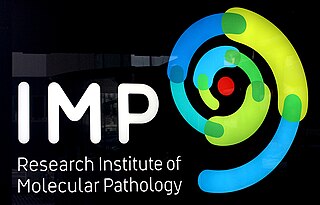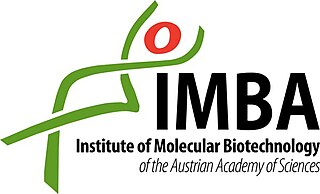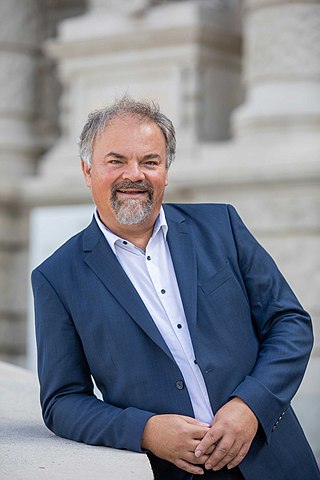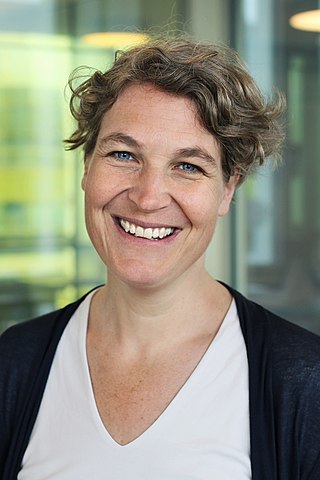Related Research Articles
Carlos Martínez Alonso, was born in Villasimpliz, in the province of León, on January 9, 1950. In 1974 he obtained a chemistry degree from the Universidad Complutense of Madrid. Four years later, in 1978, he obtained a Ph.D. in immunology by the same university. He was appointed President of the Spanish National Research Council (CSIC) from 2004 to 2008, and Secretary of State for Research in the Ministry of Science and Innovation from early 2008 to December 2009.

The Research Institute of Molecular Pathology (IMP) is a biomedical research center, which conducts curiosity-driven basic research in the molecular life sciences.

The Institute of Molecular Biotechnology (IMBA) is an independent biomedical research organisation founded by the Austrian Academy of Sciences in cooperation with the pharmaceutical company Boehringer Ingelheim. The institute employs around 250 people from over 40 countries, who perform basic research. IMBA is located at the Vienna BioCenter (VBC) and shares facilities and scientific training programs with the Gregor Mendel Institute of Molecular Plant Biology (GMI) of the Austrian Academy of Sciences and the Research Institute of Molecular Pathology (IMP), the basic research center of Boehringer Ingelheim.
The Wittgenstein Award is an Austrian science award supporting the notion that "scientists should be guaranteed the greatest possible freedom and flexibility in the performance of their research." The prize money of up to 1.5 million euro make it the most highly endowed science award of Austria, money that is tied to research activities within the five years following the award. The Wittgenstein-Preis is named after the philosopher Ludwig Wittgenstein and is conferred once per year by the Austrian Science Fund on behalf of the Austrian Ministry for Science.
CellCognition is a free open-source computational framework for quantitative analysis of high-throughput fluorescence microscopy (time-lapse) images in the field of bioimage informatics and systems microscopy. The CellCognition framework uses image processing, computer vision and machine learning techniques for single-cell tracking and classification of cell morphologies. This enables measurements of temporal progression of cell phases, modeling of cellular dynamics and generation of phenotype map.

The Vienna BioCenter is a cluster of life science research institutes and biotechnology companies located in the 3rd municipal District of Vienna, Austria. It grew around the Research Institute of Molecular Pathology (IMP), which opened in 1988. The entities at the Vienna BioCenter employ more than 2,000 people, including 600 students.
Elly Margaret Tanaka is a biochemist and Scientific Director at the Institute of Molecular Biotechnology of the Austrian Academy of Sciences (IMBA) in Vienna, Austria. Tanaka studies the molecular cell biology of limb and spinal cord regeneration as well as the evolution of regeneration.

Denise P. Barlow was a British geneticist who worked in the field of epigenomics. Barlow was an elected member of European Molecular Biology Organization (EMBO), an honorary professor of genetics at the University of Vienna and recipient of the Erwin Schrödinger Prize of the Austrian Academy of Sciences. In 1991, she discovered the first mammalian imprinted gene, IGF2R, which codes for the insulin-like growth factor.
Jan-Michael Peters is a cell- and molecular biologist. Since 2013, he is Scientific Director of the Research Institute of Molecular Pathology (IMP) in Vienna.
Alexander Stark is a biochemist and computational biologist working on the regulation of gene expression in development. He is a senior scientist at the Research Institute of Molecular Pathology (IMP) at the Vienna Biocenter and adjunct professor of the Medical University of Vienna.

Melina Schuh is a German biochemist and Director at the Max Planck Institute for Multidisciplinary Sciences. She is known for her work on meiosis in mammalian oocytes, for her studies on the mechanisms leading to the age-related decline in female fertility, and for the development of the Trim-Away protein depletion method.
Meinrad Busslinger is a biochemist and immunologist, renown for his work on B cells. He is a Senior Scientist and Scientific Deputy Director of the Research Institute of Molecular Pathology (IMP) in Vienna, Austria.

Jürgen Knoblich is a German molecular biologist. Since 2018, he is the interim Scientific Director of the Institute of Molecular Biotechnology (IMBA) of the Austrian Academy of Sciences in Vienna.
Julius Brennecke is a German molecular biologist and geneticist. He is a Senior Group Leader at the Institute of Molecular Biotechnology. (IMBA) of the Austrian Academy of Sciences in Vienna.
Kikuë Tachibana is a Japanese-Austrian molecular biologist and director at the Max Planck Institute of Biochemistry (MPIB) in Martinsried, Germany. Formerly, she was a group leader at the Institute of Molecular Biotechnology (IMBA) in Vienna, Austria.

Dirk Schübeler is a German researcher, Director of the Friedrich Miescher Institute for Biomedical Research (FMI) and professor at the University of Basel. He is an expert in gene regulation.
Eileen E. M. Furlong is an Irish molecular biologist working in the fields of transcription, chromatin biology, developmental biology and genomics. She is known for her work in understanding how the genome is regulated, in particular to how developmental enhancers function, how they interact within three dimensional chromatin topologies and how they drive cell fate decisions during embryogenesis. She is Head of the Department of Genome Biology at the European Molecular Biology Laboratory (EMBL). Furlong was elected a member of the European Molecular Biology Organization (EMBO) in 2013, the Academia Europaea in 2016 and to EMBO’s research council in 2018.
Juri Rappsilber is a German chemist in the area of mass spectrometry and proteomics.

Andrea Pauli is a developmental biologist and biochemist studying how the egg transitions into an embryo, and more specifically the molecular mechanisms underlying vertebrate fertilisations, egg dormancy, and subsequent egg activation. Her lab uses zebrafish as the main model organism. Andrea Pauli is a group leader at the Research Institute of Molecular Pathology (IMP) at the Vienna Biocenter in Austria.

Paola Picotti is an Italian biochemist who is Professor for Molecular Systems Biology at ETH Zürich. She is Deputy Head of the Institute for Molecular Systems Biology. Her research investigates how the conformational changes of proteins impact molecular networks with cells. She received numerous awarded awards, among which the 2019 EMBO Gold Medal.
References
- ↑ "Daniel Gerlich". IMBA – Institute of Molecular Biotechnology. Retrieved 2019-07-16.
- ↑ "Daniel Gerlich | PhD | IMBA Institute Of Molecular Biotechnology, Vienna | ResearchGate". ResearchGate. Retrieved 2019-07-16.
- ↑ "GENTECHNIKKOMMISSION – PDF Kostenfreier Download". docplayer.org. Retrieved 2021-01-14.
- ↑ Mitter, Michael; Gasser, Catherina; Takacs, Zsuzsanna; Langer, Christoph C. H.; Tang, Wen; Jessberger, Gregor; Beales, Charlie T.; Neuner, Eva; Ameres, Stefan L.; Peters, Jan-Michael; Goloborodko, Anton (October 2020). "Conformation of sister chromatids in the replicated human genome". Nature. 586 (7827): 139–144. Bibcode:2020Natur.586..139M. doi:10.1038/s41586-020-2744-4. ISSN 1476-4687. PMC 7116725 . PMID 32968280.
- ↑ Cuylen, Sara; Blaukopf, Claudia; Politi, Antonio Z.; Müller-Reichert, Thomas; Neumann, Beate; Poser, Ina; Ellenberg, Jan; Hyman, Anthony A.; Gerlich, Daniel W. (14 July 2016). "Ki-67 acts as a biological surfactant to disperse mitotic chromosomes". Nature. 535 (7611): 308–312. Bibcode:2016Natur.535..308C. doi:10.1038/nature18610. ISSN 1476-4687. PMC 4947524 . PMID 27362226.
- ↑ "Life Sciences – Programmes – WWTF – Vienna Science and Technology Fund". www.wwtf.at. Retrieved 2021-01-14.
- ↑ Dr. Michael Strassnig. "Life Sciences – Programme – WWTF – Wiener Wissenschafts-, Forschungs- und Technologiefonds". www.wwtf.at (in German). Retrieved 2021-01-14.
- ↑ Dr. Michael Strassnig. "Life Sciences – Programme – WWTF – Wiener Wissenschafts-, Forschungs- und Technologiefonds". www.wwtf.at (in German). Retrieved 2021-01-14.
- ↑ "FWF Project Finder – Auswahlmaske". pf.fwf.ac.at. Retrieved 2021-01-14.
- ↑ "Daniel Gerlich : European Science Foundation". archives.esf.org. Retrieved 2021-01-14.
- ↑ "New recruits in fight against cancer and diabetes". www.ethlife.ethz.ch. Retrieved 2021-01-14.
- ↑ "ERC FUNDED PROJECTS". ERC: European Research Council. Archived from the original on 2021-01-13. Retrieved 2021-01-14.
- ↑ "Find people in the EMBO Communities". people.embo.org. Retrieved 2019-07-16.
- ↑ "ERC Advanced Grants 2021" (PDF). Archived (PDF) from the original on 2021-04-22.
- ↑ "Daniel Gerlich elected to Academia Europaea".